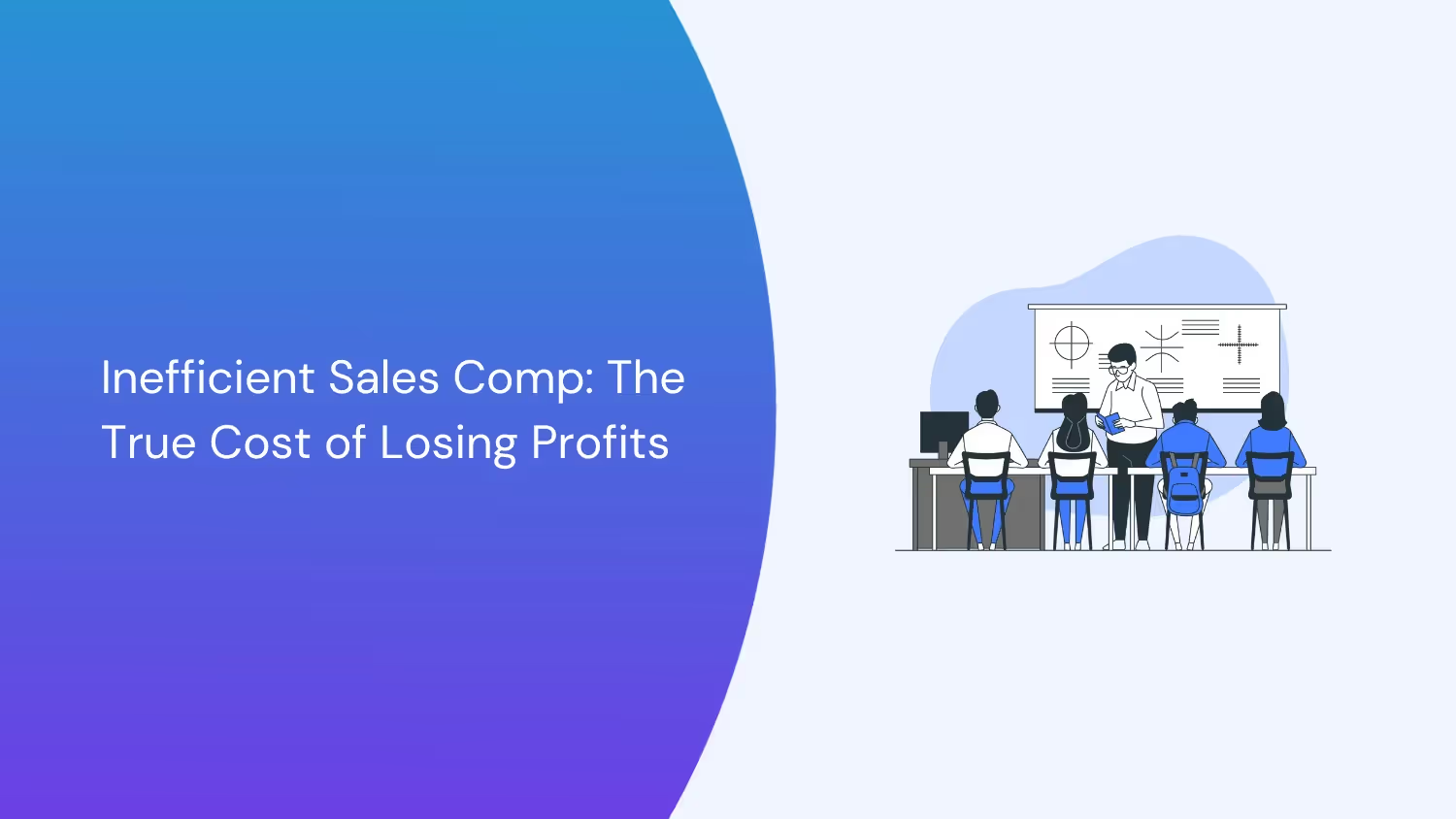The Real Cost of a Poor Sales Compensation Plan

Meet Carol, a seasoned Account Executive at a thriving SaaS company, whose journey through a seemingly routine sales compensation process turned into a labyrinth of frustrations and missed opportunities.
In this blog, we unravel the profound impact of an poor sales compensation plans and systems on both employees and the overall success of a business. Through Carol's story, we explore five crucial dimensions where transparency and trust play a pivotal role in reshaping the dynamics of sales compensation.
Carol is an Account Executive at a SaaS company, and this is her story.
31st January
- 12:00 pm: It may be the end of January but Carol is still in the holiday spirit. She nailed her sales quota last year and is waiting for a windfall commission! She’s already made plans about how she’s going to spend the money.
- 5:00 pm: The salary arrives, but she is surprised (unpleasantly). It’s $5,000 less than what she expected.
- 6:00 pm: She calls her finance team but they don’t answer as they are busy with month-end reporting and audits.
- 7:00 pm: She calls her manager but he doesn’t have a clue either, he promises to check and revert.
5th February
- 12:00 pm: After multiple follow-ups and a seemingly endless wait, the email reply finally comes from the finance team but it does not explain much. Carol is not convinced and feels cheated.
- 1:00 pm: Carol vents her frustration with her manager and her peers and is low on morale for the next few days or even weeks.
- Months later: Still unconvinced, Carol has vowed to keep parallel accounts of her commission from now on as she does not trust the calculations. This will take days of effort each quarter and will take her away from selling but she does not have a choice. After all, this is what she works for.
If this happens again, she might even look for another job.
The story behind this story: The commission check that Carol got was in fact correct. The finance team’s calculation was spot on.
However, in the absence of
- Clarity on the comp plan; and
- Transparency of the calculations, the company may now lose an A-player.
Salespeople are crucial to the success of any business, as the revenue they generate is what pays the bills and allows operations to run. They have an immediate impact on key financial metrics including the company’s bottom line and top line expansion. They are arguably, the company’s most costly and valuable resource.
With such a huge impact, the best-performing salespeople are also very valuable and hard to replace. They take ownership of a slice of the company goal (sales quota) and share in the revenue (sales commission).
Typically, half of a salesperson’s compensation is variable, dependent on their performance, and governed by the rules of their sales comp plan. With such a large part of their compensation riding on commissions, they are very sensitive to any errors or mismatches from their expectations.
Often, the errors are perceived (not actual), stemming from the sales rep’s lack of clarity of how the comp plan works and cemented further by a lack of transparency into the payouts.
With revenue, sales rep attrition, culture, and customer experience at stake, a company can ill afford to have a sales compensation process that is full of friction.
Lessons from Carol's Story about Poor Sales Compensation Plans and Systems
Rethinking Return on Investment
Despite paying Carol correctly, the company has a demotivated sales rep at risk of leaving.
Carol’s Company spends up to 5–10% of its annual revenue in sales compensation, i.e., a $ 10 million company could be spending as much as $1 million annually on sales commissions.
Is that an expense or an investment?
If it’s an expense, then Carol should be paid as a part of the fixed or base salary. However, if it’s an investment designed to drive optimum performance, then the return needs to be monitored closely, which was clearly lacking in Carol's case.
If sales reps do not understand their compensation rate and how they will be paid, it is extremely difficult to use compensation to motivate them to accomplish a specific goal.
The question arises: Can manual, spreadsheet-based processes effectively manage a multi-million-dollar investment? The answer lies in embracing automation and real-time insights to optimize returns.
🔍 Quick read: Calculating SaaS Sales Commissions: Why spreadsheets don't work
Clarity Over Confusion
Despite Carol hitting her sales quota, the lack of clarity in her compensation plan left her feeling undervalued and questioning her commitment to the company. A transparent and comprehensible compensation plan is not just a perk for employees; it's a strategic investment that fosters motivation and aligns individual efforts with organizational goals.
The burning question: Can a company truly thrive without ensuring its sales team understands and believes in their compensation structure?

Trust is the Cornerstone
Carol's trust in the accuracy of her commission payout crumbled due to a lack of transparency and delayed communication from the finance team. Trust is the foundation of any successful employee-employer relationship, and in the world of sales, it can be the key driver for sustained performance.
Losing trust not only impacts morale but may lead to the departure of high-performing individuals.
Consider this: Is the company willing to risk losing valuable team members due to doubts about the accuracy of their earnings?

Empowering Finance with Automation
Beyond Carol's frustration, the finance team faced the uphill task of manually managing complex commission calculations. An automated sales compensation process not only reduces errors but empowers the finance team to transition from data manipulation to strategic financial analysis.
This shift not only enhances job satisfaction but elevates the role of finance in driving business success.
The pivotal question: Shouldn't finance teams be equipped with tools that allow them to focus on strategic initiatives rather than drowning in manual calculations?

Motivation Through Clarity
The absence of clarity in Carol's commission calculations affected her motivation to surpass her quota. A well-structured compensation plan can be a powerful motivational tool, driving salespeople to push beyond targets and achieve exceptional results.
Investing time in designing and communicating a clear compensation plan can be the catalyst for sustained high performance.
Reflect on this: How can a company expect its sales team to strive for excellence if the compensation structure remains shrouded in ambiguity?

Recognizing Value and Time
Carol's experience highlighted the significant time wasted due to delayed and inadequate responses from the finance team. Sales reps, with limited time dedicated to selling, cannot afford inefficiencies in the compensation process.
Recognizing their value through efficient and timely compensation processes not only boosts morale but also preserves their focus on revenue-generating activities.
Ask yourself: Is the company inadvertently encouraging top performers to seek greener pastures by undervaluing their time and efforts?

The Power of Incentives
Beyond the financial aspect, incentives can serve as a powerful motivator for sales teams. Carol's story highlights the importance of aligning incentives with individual and team goals. Incentives could range from recognition programs, career development opportunities, or even unique perks that resonate with your sales team's aspirations.
By diversifying incentives, you not only enhance motivation but also cater to the diverse needs and preferences of your sales force.

🔔 Must read: What is SPIFF in sales: A Comprehensive Guide for 2024
Building a Collaborative Culture
Sales compensation is not solely the responsibility of the finance department or upper management. Creating a collaborative culture where sales teams actively participate in shaping compensation structures can lead to a sense of ownership.
Encourage feedback sessions and involve your sales force in decision-making processes related to their compensation plans. This collaborative approach fosters a sense of belonging and ensures that compensation structures are fair and effective.

Continuous Learning and Development
Carol's experience highlights the need for ongoing education about the intricacies of the compensation plan. Implementing a continuous learning and development program ensures that sales teams are always up-to-date with changes in the compensation structure.
This not only enhances their understanding but also empowers them to make informed decisions about their career path within the organization.

Utilizing Technology for Analytics
Embrace technology not just for automation but also for analytics. A data-driven approach allows you to track the effectiveness of your compensation plan, identify trends, and make informed adjustments.
By leveraging analytics, you can gain insights into the performance of individual sales reps, identify areas for improvement, and optimize your compensation strategy for maximum impact.

🔔 Also read: Automated CRM Commission Tracking: Benefits & Myths
Creating a Feedback Loop
Establishing a feedback loop is essential for refining and optimizing your sales compensation plan. Encourage an open dialogue between sales teams and management to gather feedback on the effectiveness of the current plan.
Regularly review and adapt the compensation structure based on this feedback, ensuring it remains dynamic and responsive to the evolving needs of your sales force.

Sales compensation is more than just a monetary transaction; it's an intricate dance of transparency, trust, and strategic alignment. An efficient and transparent sales compensation process not only motivates and retains top talent but also contributes to a positive company culture.
Here is a good resource to build on the learnings from this blog 👇
The shift from confusion to clarity, doubt to trust, and manual to automated processes signifies a transformation that not only benefits individual employees like Carol but also propels the entire organization toward unparalleled success.

Transform Your Sales Culture with Sales Compensation Software
Supercharge your sales team's motivation and success by exploring cutting-edge sales compensation solutions like Visdum tailored for your business. Revolutionize the way you reward and inspire your sales force with our advanced tools designed to bring transparency, trust, and transformation to your compensation strategies.
Here's how our solutions align seamlessly with your sales objectives:
- Customized Clarity: Tailor compensation plans that are clear, comprehensible, and aligned with individual and team goals.
- Trust-Driven Processes: Implement processes that prioritize trust, accuracy, and timely communication, ensuring your sales team feels valued and confident in their earnings.
- Empower Finance with Ease: Embrace automation to streamline manual processes, freeing up your finance team to focus on strategic initiatives that drive business success
Act now to create an environment that fuels motivation, trust, and transformation in your sales force!
Talk to our sales compensation experts today!
FAQs
What potential challenges must sales compensation plans avoid?
Effective sales compensation plans must steer clear of common pitfalls to ensure motivation and performance. Challenges include lack of transparency, confusing structures, delayed payouts, and poor communication. Addressing these issues prevents demotivation, loss of trust, and potential attrition among sales teams. A well-crafted plan aligns with company goals, offers clarity, and motivates sales reps to consistently exceed targets.
What makes a good sales compensation plan?
A good sales compensation plan is characterized by clarity, fairness, and alignment with organizational objectives. It should be easy to understand, transparent, and motivate sales teams to achieve both individual and collective goals. A balanced mix of fixed and variable components, clear performance metrics, and timely payouts contribute to a plan's success. Regular reviews, flexibility to adapt to changing circumstances, and open communication channels ensure the plan remains a dynamic tool that fosters engagement and success.
What is a 70-30 salary split?
A 70-30 salary split in sales refers to the proportion of fixed (base) salary to variable (commission) pay. In this scenario, 70% of a salesperson's compensation is fixed, providing a stable income, while the remaining 30% is variable and tied to their performance or sales achievements. This structure aims to strike a balance between financial stability and incentivizing high performance. The fixed portion provides a consistent income, while the variable component rewards exceptional sales efforts, aligning the interests of the salesperson with the company's goals.
What is the 3-3-3 rule in sales?
The 3-3-3 rule in sales emphasizes timely and effective follow-up. It suggests making contact with a prospect within 3 minutes of their inquiry, following up again within 3 hours, and then reaching out once more within 3 days. This rule acknowledges the importance of prompt responses in capturing a prospect's interest and fostering engagement. By adhering to the 3-3-3 rule, sales professionals increase their chances of converting leads into customers, demonstrating the significance of agility and proactivity in the sales process.


.webp)
.webp)

